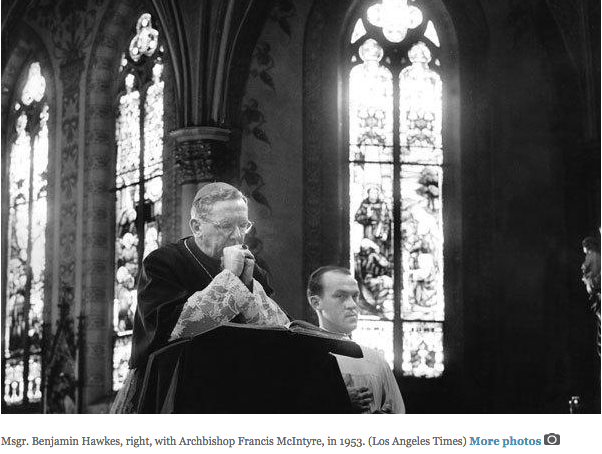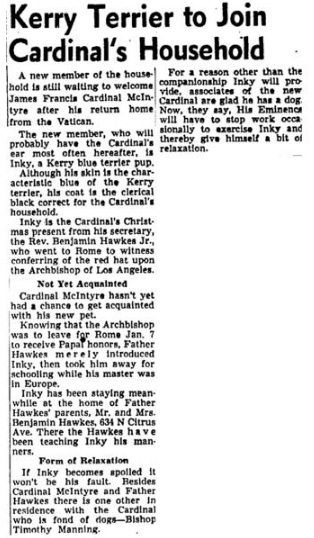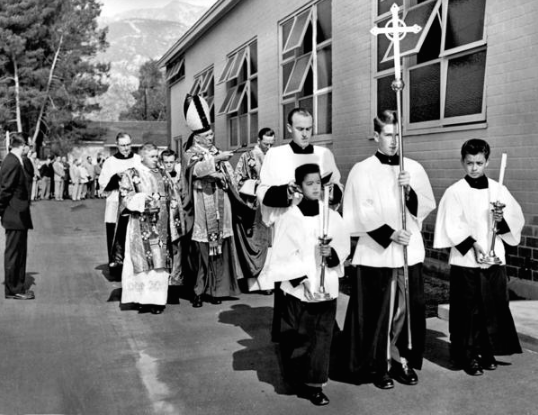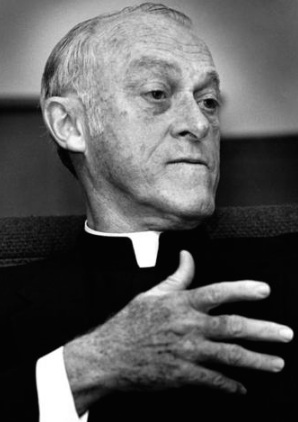Starting in the 1950s, Msgr. Benjamin Hawkes got L.A. churches built, hobnobbed with the rich and helped the poor. Ten years after his death, he was accused of sexual abuse.By Harriet Ryan http://www.latimes.com/local/la-me-hawkes-20130508-dto-htmlstory.html
By the time the letter arrived, the grass on Benjamin Hawkes' grave had grown thick. Historians had chronicled how he transformed the Los Angeles archdiocese into a billion-dollar institution. His portrait had been etched into a metal plaque and bolted to the wall of a sprawling church on Wilshire Boulevard. The archbishop, Roger Mahony, who had presided at the dedication of that plaque, had become a cardinal with thinning hair and deep wrinkles. The letter came to rest on his desk. "It's my turn to stand up and set the record straight," the shaky cursive read. "Msgr. Hawkes was not a great priest, he was a sick man who used his status to abuse many." In the postwar boom that created modern Southern California, Msgr. Benjamin Hawkes was a power broker. The second-in-command to two cardinals, he ran the Los Angeles church for three decades, a span during which it grew into the largest, most diverse and by some counts wealthiest archdiocese in the nation. His knack for money and real estate gave him influence from Rome to Hollywood. He socialized with real estate titans, advised Vatican officials and even taught actor Robert DeNiro how to play a priest for a film role inspired by Hawkes' life. Msgr. Hawkes was not a great priest, he was a sick man who used his status to abuse many." But Hawkes' revered place in the archdiocese's history is being reconsidered in light of the recent release of his confidential church personnel file. The file, made public in January in a lawsuit against the church, shows that 10 years after his 1985 death, two men came forward to say Hawkes had sexually abused them as teenagers. "I went into shock," said prominent California historian Kevin Starr, who has written about Hawkes. "This was a great big commanding figure.... A celebrity."
Cardinal James McIntyre took shotgun, Father Benjamin Hawkes the wheel. Their destination was the edge of town — wherever it might be that week. Southern California's population was exploding in the 1950s and '60s. Farms were becoming subdivisions overnight. A thousand Catholics moved into the archdiocese each week, and the church opened a new school every 26 days. Snapping up cheap parcels had become a pressing concern for the archbishop and the young priest who was his most trusted advisor. "They would drive the freeways and pick pieces of property out," recalled Hawkes' longtime friend Harley Noel. Hawkes, an accountant before entering the priesthood, had a head for numbers that attracted McIntyre's attention. The archbishop plucked him from parish work in 1952, just two years after Hawkes' ordination, and installed him at the chancery. Hawkes rose to the top quickly and stayed there for 33 years. His titles changed — private secretary, chancellor, vicar general — but his power endured. McIntyre and his soft-spoken successor, Timothy Manning, who arrived in 1970, were deeply spiritual men who preferred to spend their days crafting homilies and visiting parishes. They happily handed Hawkes their administrative duties. "They weren't trained ... to be financial wizards. Msgr. Hawkes was. That was his background," Hawkes' former secretary, Betty Cotton, said. From the Archive
Msgr. Benjamin Hawkes held the purse strings of an institution with status and influence difficult to imagine today. And he was a common figure in the press' coverage of Cardinal Francis McIntyre. More archival coverage Hawkes liked to say he was responsible for "everything with a dollar sign in front of it," but in practice, he handled everything, down to the way church walls were painted. He made the budget, mapped out new parishes, hired contractors and even designed some of the churches. He decided which priests got new cars and handpicked seminarians to train in Rome, including two future cardinals. When scandal loomed, McIntyre and Manning consulted Hawkes. He signed the checks for alcoholic priests to go to rehab and for those who molested children to get therapy, according to interviews and church documents reviewed by The Times. His temper was as legendary as his power. When someone was late or sloppy, his shouts rang through the chancery. Priests sometimes left his offices in tears. A secretary who made a dictation error would have the offending page thrown back at her. "He alienated people," his longtime friend Noel acknowledged. "But the alienation part — that's how they built the archdiocese." By 1967, the archdiocese's massive construction campaign had landed $27 million in debt. Hawkes' solution was to turn the chancery into a sort of bank for all the parishes. Centralizing assets allowed the church to use money from wealthy congregations to underwrite poor parishes. "We believe that the haves should help the have-nots," Hawkes often said. Less-affluent neighborhoods often revolved around those parishes, and their schools turned out generations of Catholics who remained devout as they climbed the socioeconomic ladder. Hawkes' work put him in close contact with business tycoons and leading Catholic families like the O'Malleys and Dohenys. He became a regular at the Jonathan Club and the Los Angeles Country Club and vacationed at the Hawaii home of a developer friend. "The rich have souls too," he told anyone who questioned his social circle. Hawkes lived in the rectory of St. Basil's, an opulent modern church he designed and had built on Wilshire Boulevard in what is now Koreatown. The congregation was a mix of wealthy Hancock Park families and recent immigrants from the surrounding area. When some altar boys couldn't afford Catholic school, Hawkes paid the tuition himself or arranged donations from rich friends. Friends saw it as typical of his quiet generosity that they saw behind his intimidating style. "He helped people out, especially behind the scenes," said Hawkes' close friend Msgr. Jeremiah Murphy. Hawkes' reputation grew beyond the church. "A legend," the Times said in 1982. "One of the most powerful men in the city," Los Angeles magazine pronounced. DeNiro prepared to play the powerful monsignor in "True Confessions" — a role reportedly based on Hawkes — by watching him say Mass. In 1985, an energetic reformer was appointed archbishop. Mahony was 49, the youngest archbishop in the nation, and he made it clear that he planned to modernize the archdiocese. In his eyes, the future of the church lay in Latino immigrant communities, not in the Westside mansions Hawkes frequented.
Hawkes, fourth from right, is with Archbishop James McIntyre at the blessing of the school and Church of the Assumption of the Blessed Virgin Mary in Pasadena in 1952. (Los Angeles Times) More photos "There was some type of tension," recalled Hawkes' niece, Margaret. "My uncle was from the old school and Mahony was more of a radical." Hawkes submitted his resignation before Mahony was formally installed. He was leaving the once-indebted church with nearly $1 billion in assets. His intent was to stay on until the next year to train the seven or eight people it would take to replace him. Mahony wanted a quicker transfer of authority. Two weeks into his tenure, he informed Hawkes he was stripping him of the power to carry out financial transactions over $100,000. The day after Hawkes received the news, he suffered a fatal stroke. He was 66. Ten years later, in 1995, the first accuser came forward. "Even though he is dead, I believe the Archdiocese should be aware of Msgr. Hawkes' actions," his April 1995 letter to the archdiocese stated. "The man that I trusted and respected as a mentor and spiritual father took advantage of his position and left me with a traumatic experience to deal with." In the late 1970s and early 1980s, he had been an altar boy at St. Basil's. His single mother couldn't afford to send him to Catholic school, but Hawkes said he would pay tuition at the junior seminary. In return, he had to work every Saturday and Sunday in the church. It was on those days, he said, that Hawkes molested him. "He never let me forget he was paying for my tuition," he told church officials years later. "Monsignor had a way of subduing someone so you'd feel like nothing." The man brought his therapist to the meeting and told the officials he wanted his experience documented so others would be believed if they came forward. Five years later, a second man phoned the church's longtime lawyer. John McNicholas recognized the caller's name. He had been an altar boy at St. Basil's and, with Hawkes' help, had gone to college and law school. He now held a prominent position in law enforcement. Msgr. Hawkes abused me, he told the lawyer. "I was stunned," McNicholas recalled recently. At a meeting with top archdiocese officials, the man, a veteran of years of undercover work, sobbed. The abuse, he said, started when he was 12 and lasted a decade. It began with the priest's hand in his pants when he was dressing for Mass, but it escalated into Hawkes pinning him naked on a bed in the rectory and masturbating on him, he said. He eventually became strong enough to fight Hawkes off, but the monsignor was still making unwanted advances until the week he died, he told them.
Msgr. Benjamin Hawkes in 1982. He died in 1985, shortly after the new archbishop, Roger Mahony, stripped him of the power to carry out financial transactions over $100,000. (Los Angeles Times) More photos He said that as a teen, he tried repeatedly to quit his job in the rectory. Each time Hawkes would tell his parents, struggling immigrants who spoke little English, that he would lose his tuition and his chance to be successful in America. In a subsequent sworn statement to church lawyers, he recalled a 1975 incident when he locked himself in a bathroom to avoid Hawkes. "He ... grabbed me by the throat and told me how dare I had [locked] the doors," he said in the statement. "He put his hands on my genital area ... and said, 'This is like mine because I am your father and I am taking care of you.' " Hawkes had taken him to Hawaii and to society events and fancy restaurants where he met "all these powerful, rich people," he said. "Msgr. Hawkes would joke about me always being a virgin and they'd laugh," he told the lawyers. It was obvious something bad was going on, the man said, but no one called Hawkes on it. "Everyone was scared of him," he said. In the years after Hawkes' death, the church had published books that praised his work. The archdiocese had named a homeless shelter in his honor. Mahony himself had dedicated the large plaque in the foyer of St. Basil's. A hundred people still gathered on the anniversary of Hawkes' death for a memorial Mass. In those same years, Mahony had become well versed in clergy abuse. He had sent many priests for treatment, read the graphic reports of their therapy sessions and in some cases signed confidential settlements with their victims. After learning about the second accuser, the cardinal took the unusual step of calling the man's therapist. Would your patient tell me about Hawkes, he asked. "He wanted to hear my story," the man told archdiocese lawyers later. "I told him enough that he prayed with me." The man subsequently asked the church for $1.9 million. Hawkes' personnel file doesn't include what happened next, but a lawyer for the archdiocese said the church reached financial settlements with both accusers. The terms of their agreements are confidential and the names of both men were redacted from Hawkes' file. Both accusers told the church other boys were also victimized by Hawkes, but in the wave of lawsuits against the church a decade ago, no one else accused him. In his will, Hawkes directed that $1,000 be used to pay for Masses for the repose of his soul. Those 200 services were completed long ago, but the debate about his legacy remains unsettled. Historian Starr said he finds it impossible to look at Hawkes' achievements in the same way as before. "I just don't think any accomplishment in the world of church administration can offset what those files contain," he said. Accolades and accusations>>Msgr. Benjamin Hawkes held a revered place in L.A. Archdiocese history. But his legacy is being reconsidered in light of his recently released confidential church personnel file. 
Vatican telegramCondolences from Pope John Paul II; Hawkes was in Rome the week before his death. 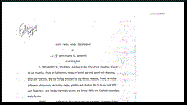
Hawkes' willHawkes' last will and testament. He had a fatal stroke when he was 66. 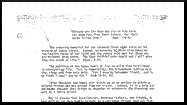
Donohue's eulogyEulogy of Hawkes delivered by Sir Daniel J. Donohue at the California Club. 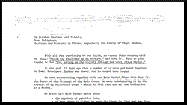
Rigali's eulogyThe night before Hawkes' 1985 funeral, Archbishop Justin Rigali, a Vatican official who had gone to seminary in Los Angeles, delivered a eulogy praising the monsignor as a gift from God. Rigali eventually became a cardinal and ended his career amid a scandal in the Philadelphia archdiocese over the handling of sex abuse cases. Some friends are convinced that Hawkes was wrongly accused, including many of the approximately 50 people who still gather for his memorial Mass. "I think they made it up for money," said Murphy, who presides at the Mass. Noel, a retired entrepreneur who now works in prison ministry, said that when he opened a new halfway house last winter, he didn't hesitate to name it in Hawkes' honor. "There's no way in God's Earth" that Hawkes abused the men, he said. "I'd stake my life and my soul on it." The church's lawyer, J. Michael Hennigan, said an archdiocese investigation concluded that both claims were credible. "These two boys seemed unlikely to have made it up," he said. Cotton, Hawkes' secretary, said she doesn't know what to believe. There was always a twin aspect to his personality — the harsh businessman and the generous priest. Maybe there was another, secret side she never saw. "Is it possible? I just don't know," she said. "If it's true, then he fell from grace big time." At Hawkes' funeral Mass, the man who would become the second accuser was an altar server. Everyone else was crying, he told church officials, but he felt only relief. "I can still sense Msgr. Hawkes," he wrote to Mahony. "I dream about him a lot and it scares me very much, but I cannot let him win."
|
.
Any original material on these pages is copyright © BishopAccountability.org 2004. Reproduce freely with attribution.
